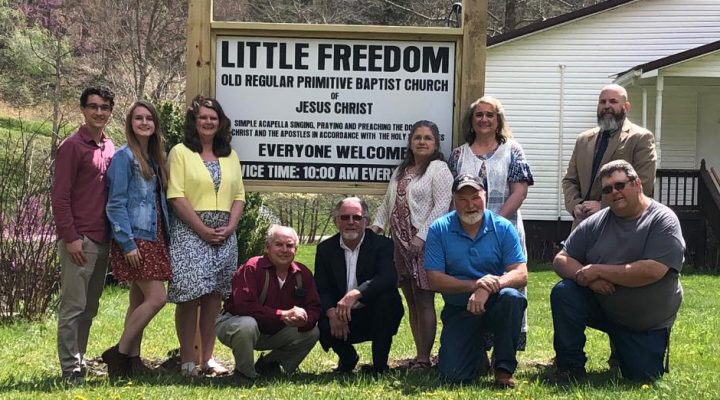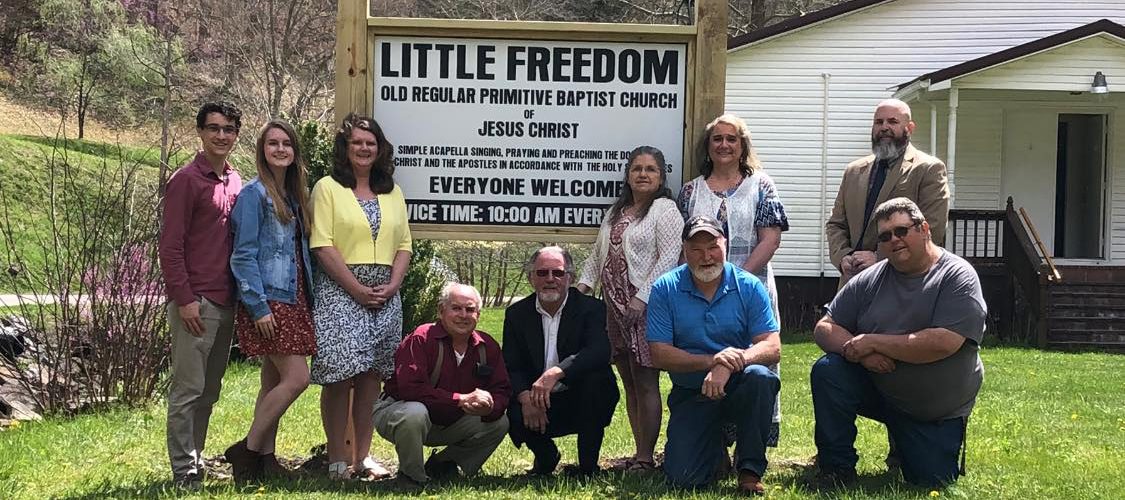In the year 1741 at the Congregational Church in Enfield, Conn., Jonathan Edwards, pastor of the Congregational Church in Northampton, Mass., declared:
The God that holds you over the pit of hell, much as one holds a spider, or some loathsome insect over the fire, abhors you, and is dreadfully provoked: His wrath towards you burns like fire; he looks upon you as worthy of nothing else, but to be cast into the fire; he is of purer eyes than to bear to have you in his sight; you are 10,000 times more abominable in his eyes, than the most hateful venomous serpent is in ours.
Edwards’ words sent such terror into the hearts of his totally depraved audience that he was at times unable to make himself heard over their screams and cries for God’s mercy. The Enfield sermon is better known as “Sinners in the Hands of an Angry God,” surely the most famous and widely circulated sermon Jonathan Edwards ever preached. For decades it was required reading for high school English classes, students less terrified although no less totally depraved than his initial hearers, encapsulating the doctrines set forth by John Calvin, the reformer of Geneva, Switzerland.

Bill Leonard
“In Adam’s fall we sinned all,” the New England Primer of 1690 began, teaching Puritan children the alphabet with biblical soberness. Classic Calvinism asserted that as descendants of Adam, thus tainted with original sin, the human race deserves damnation by a holy God who nonetheless offers unconditional “election” in redemption, an eternal salvation made possible by the sinless sacrifice of Christ’s death on the Cross and resurrection for the sins of the world. (The elect world, at least.)
In mainstream Calvinism, Christ’s death is a “limited atonement” efficacious only for the elect, redeemed by irresistible grace before departing this world. In Primitive Baptist theology, sinners do not find God; God finds sinners, providing grace that makes repentance and faith possible for the totally depraved.
That Calvinism was carried to the American frontier by clergy and laity from Presbyterian, Congregational and Baptist traditions. Calvinist preachers declared the gospel as if everyone could be saved, knowing God would use that word to awaken the elect.
Primitive Baptists are a specifically Calvinist communion that developed among those who resisted “human efforts” to “make Christians” through the use of such “unbiblical” organizations as revival meetings, Sunday schools and missionary endeavors — futile, self-righteousness attempts to usurp the work of the Spirit. One early document stated: “We … declare a non-fellowship with all such human institutions” and “all societies and traveling beggars for their support, believing them to be the emissaries and agents of antichrist and opposed to the true kingdom of Jesus Christ.”
“They felt their beliefs, dictated by Scripture, were present from the beginnings of Christianity.”
Primitive Baptists took that name because they felt their beliefs, dictated by Scripture, were present from the beginnings of Christianity.
Around the turn of the 20th century, a small but fascinatingly alternative Calvinism appeared among what came to be known as the Primitive Baptist Universalists (PBU), colorfully but incorrectly caricatured in Appalachia as “No Hellers.”
Our knowledge of the PBUs was enhanced with the 1997 publication of a volume titled In the Hands of a Happy God: the “No Hellers” of Central Appalachia, written by the late Howard Dorgan, longtime professor of communications at Appalachian State University. The book remains the single most extensive history of the Primitive Baptist Universalists.
Dorgan notes the first reference to Appalachian Calvinistic universalism appears in a 1907 statement from the minutes of the Washington District Primitive Baptist Association in West Virginia. It reads:
Resolved, that whereas, we have been troubled with the doctrine of universalism that we advise the churches that if they have any elders preaching such heresies, or members arguing it, that they admonish them to quit preaching it or talking it, and if they fail to hear them to withdraw fellowship from such.
The full-blown schism occurred among certain Tennessee and Virginia Primitive Baptists by 1924, as certain universalist-oriented congregations announced their departure from the parent group.
PBUs believe the atonement, death and resurrection of Jesus are so powerful and expansive that all people ultimately receive redemption through him. Dorgan lays out their major doctrines as follows:
- All human beings are sinful; that is the nature of the human condition.
- Satan personifies that sinfulness but is only a “natural man” who does not “exist beyond the temporal world.”
- Humans cannot escape punishment for their sinful nature, but such punishment occurs in this “temporal world,” not in an eternal hell.
- Adam and Eve’s sin “irrevocably … condemned all humankind to that sinful state,” thus the atonement of Christ “for the sins of the world” is necessary.
- Ultimately, Christ’s death and resurrection will be applied “for all humankind.” Since Adam’s sin applied to all people, Christ’s resurrection will be applied to all.
- An “elect” does exist and includes Primitive Baptist Universalists and others known only to God, who are “separated from the rest of God’s people here in time,” and who represent the continued witness of the gospel in the world.
- The elect can and do sin, punished by “hell on earth” that will purge their sins in this world, but not in eternity. Such punishment may be greater for the elect because of their close relationship with God. PBUs reject the “no heller” designation since hell occurs on earth but is not eternal.
- In the end time, Christ’s resurrection will prevail, thereby “paying the price” for all humanity to be redeemed and ending “sin,” “punishment” and death.”
- In that ultimate resurrection, all people “will go to a wholly egalitarian heaven, the culmination of Christ’s universal atonement.” The experience of hell on earth will end and only heaven will remain as the eternal abode of the entire human race.
For PBUs, hell is a realm of punishment that reflects an “absence from God’s blessing;” it is not eternal but present only in this world. Life’s sinful actions and elements are confronted in a kind of purgatory in which punishments are dispensed and experienced in this present world.
I’ve said it this way: For the PBUs, it’s hell enough right here. No one escapes without justice.
In 1805, a Baptist named Hosea Ballou published A Treatise on Atonement in which he asserted the death of Christ was so overwhelming and overcoming that it provided for the salvation of all humanity; that sin is punished in this world, not eternity; and that real pleasure is to be found in avoiding sin. In contrast to Jonathan Edwards, Ballou sought to “happify” the idea of God as a loving parent who “sent his Son” to redeem the world and return humans to the sinless state known to the world’s first couple.
PBU churches retain the hope that we are indeed held in the hands of a happy God.
“Day after day, week after week, it really is hell enough right here.”
I’m not a Primitive Baptist Universalist (yet) but felt compelled to write about them at this moment in time because day after day, week after week, it really is hell enough right here. Every week I think I’ll write about God’s good news, but then death of the innocents keeps happening — multiple Rachaels, weeping for their children because they are no more. Last week, American young people were gunned down because they knocked on the wrong door, got in the wrong car, turned around in the wrong driveway or chased a basketball into the wrong yard.
This week, I needed to hear from some folks who aren’t afraid to say God sounds like Jesus, not like Tucker Carlson; Christians who believe the God incarnated in Jesus of Nazareth is at once angry and brokenhearted because we’ve created a culture of death for American children to grow up in.
I hate writing about this week after week, but they keep dying week after week.
Primitive Baptist Universalists gave me a bit of hope, so I went online to listen to their voices. Elder Reece Maggard asked: “What’s so bad if God is gonna save us all? People you thought was friends end up hating you for that.”
Then he reached deep into my own heart: “God is the father of us all. There’s just one blood in this world. We are all a part of him, and if he would lose any part of himself, he’d be losing himself. Because we’re a part of his makeup, we’re a part of God. That’s what people don’t see, (they think) God’s separated somewhere, that he’s way out there somewhere, but it’s all right here; right here’s where we need God.”
Would to God we’d all remember that before some lost young stranger knocks on our own front doors to ask for help.
Bill Leonard is founding dean and the James and Marilyn Dunn professor of Baptist studies and church history emeritus at Wake Forest University School of Divinity in Winston-Salem, N.C. He is the author or editor of 25 books. A native Texan, he lives in Winston-Salem with his wife, Candyce, and their daughter, Stephanie.
Related articles:
The gospel of universal compassion | Opinion by Alan Bean
American Gospel: Christ Crucified is stuck in a time warp | Analysis by Rick Pidcock
Heaven-or-hell theology may be simple, but it is neither biblical nor morally defensible. What’s the alternative? | Opinion by Alan Bean


